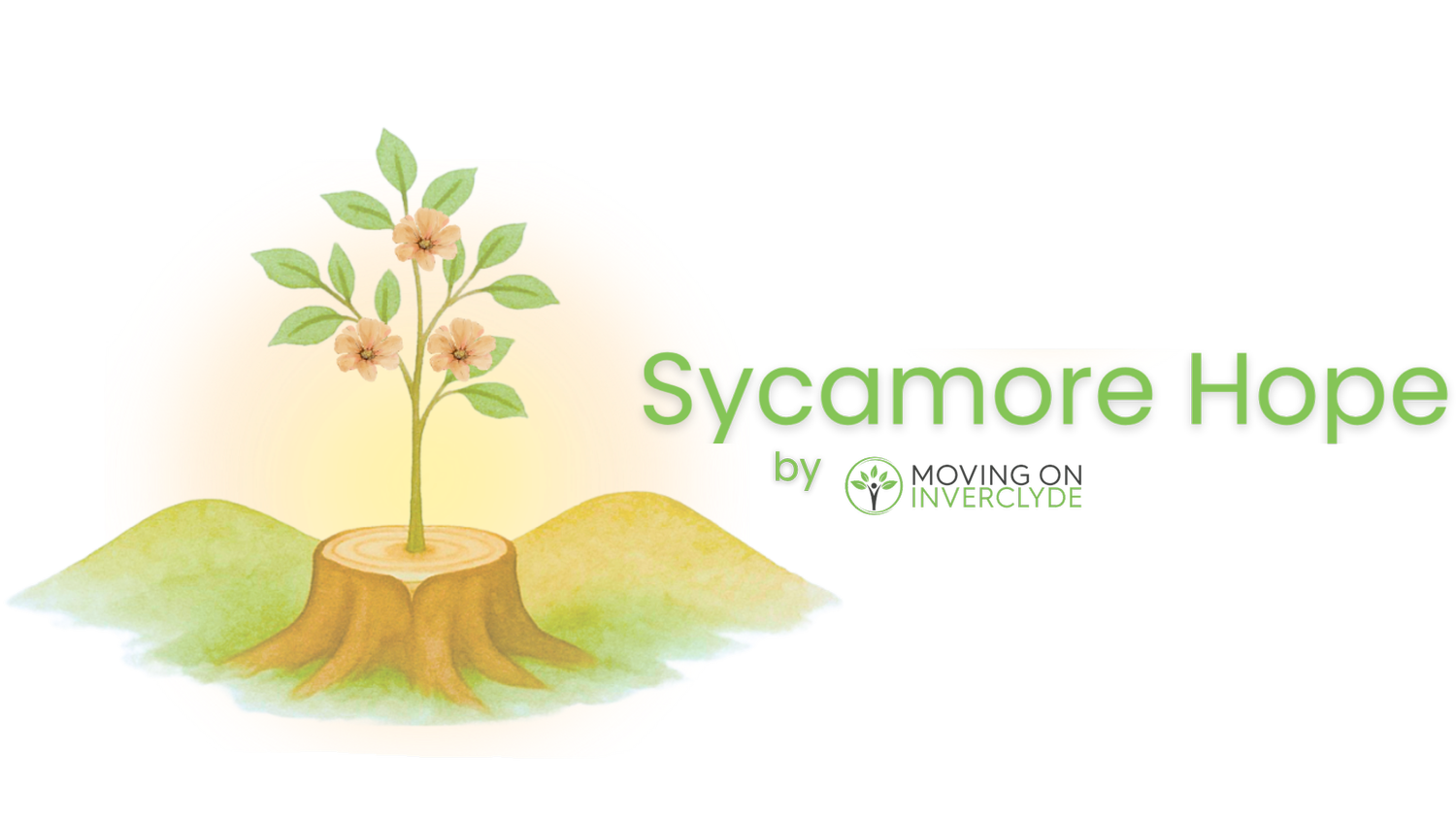
Rooted in Recovery. Growing in Strength.
For every woman ready to grow again.
This space was created by Moving On Inverclyde in collaboration with women from our local recovery community.
About Sycamore Hope…
Sycamore Hope is an online recovery resource, designed to support women on their journey to healing and empowerment. Created by Moving On Inverclyde, Sycamore Hope believes that recovery begins when women feel safe, seen, and supported!
Our story takes inspiration from the Sycamore Gap Tree. In 2023, the beloved Sycamore Gap tree was illegally cut down in an act that shocked and saddened people across the UK and beyond. For many, it felt like the loss of something sacred: a quiet companion that had stood watch between two hills for centuries, offering shelter, symbolism, and solace. But from what was felled, a sapling now grows. Moving On Inverclyde is one of only two organisations in Scotland to receive a sapling from the historic Sycamore Gap tree as part of the Tree of Hope project run by the National Trust. Read more here.
Like the sapling, Sycamore Hope honours what’s been lost, and gently holds space for what’s still possible. Whether you’re worried about your alcohol and/or drug consumption, impacted by grief, burnout, or something you can’t yet name, you’re welcome here. No labels. No judgement. Just small steps and soft support, grounded in dignity, privacy, and hope.
Women and Recovery..
Alcohol and/or drug use can affect women in ways that are different from men, shaping how problems start and how recovery feels. Women who receive gender-specific, trauma-informed treatment are up to 3 times more likely to complete recovery programmes, emphasising the need for women-only recovery spaces.
-
Women can move from first use of drugs or alcohol to addiction more quickly than men, a process known as the “telescoping effect.” Even with smaller amounts, their bodies absorb substances differently, leading to faster physical and emotional dependence.
This can mean addiction develops before anyone, including the woman herself, realises there’s a problem.
📊 Did you know? Women are nearly twice as likely to develop cravings and relapse after detox if gender-specific needs aren’t addressed.
-
Alcohol and/or drug use can take a harsher toll on women’s health. Hormonal changes can be disrupted, fertility may be affected, and damage to the liver, heart, and brain often happens more quickly than in men.
Mental health issues, such as anxiety, depression, and PTSD, are also more common, especially when alcohol and/or drug use is linked to trauma.
⚠️ Did you know? Women are more likely to die from an overdose than men when using certain substances, particularly prescription opioids and benzodiazepines.
-
Many women feel they have to keep their alcohol and/or drug use a secret, especially mothers, who fear judgement or losing custody of their children.
This shame can lead to isolated use, which increases risks and delays getting help.
Stigma remains a powerful barrier, even though addiction is a health condition, not a moral failing.
⚠️ Did you know? A woman struggling with addiction is less likely to ask for help than a man due to fear of being seen as a “bad mother” or “unfit.”
-
Women often face unique obstacles on the road to recovery. These can include lack of childcare, financial dependence, past trauma, or feeling unsafe in mixed-gender services.
Some don’t trust traditional services, especially if they’ve been let down before. Without dedicated women-only spaces, many never get the chance to fully engage in healing.
📊Did you know? Over 70% of women in treatment for substance (alcohol and/or drug) use have experienced domestic or sexual abuse, creating a critical need for safe, trauma-informed support.
-
Recovery isn’t just about stopping alcohol and/or drug use, it’s about rebuilding safety, dignity, and connection.
For many women, healing starts when they feel truly seen and supported. Trauma-informed care, peer support from other women, and body-based therapies (like yoga, art, or movement) can make all the difference.
💚Did you know? Women heal best when services are kind, patient, and built around trust.
Explore Your Path..



